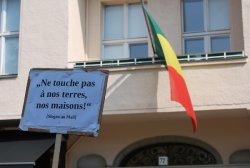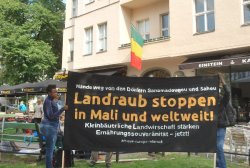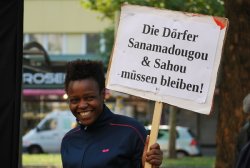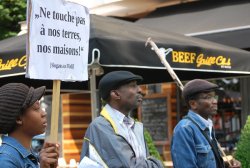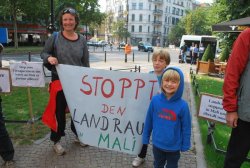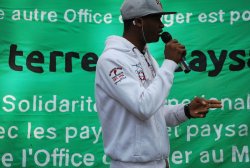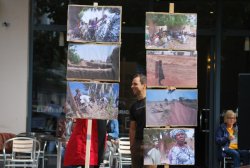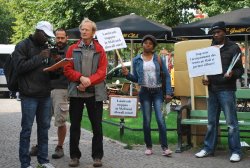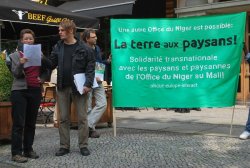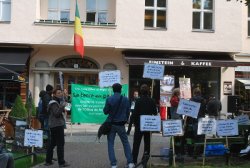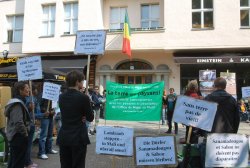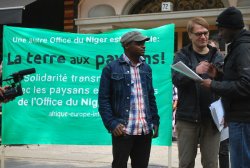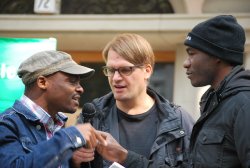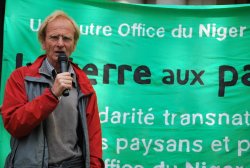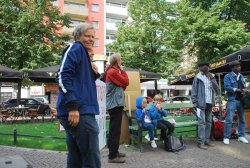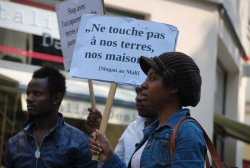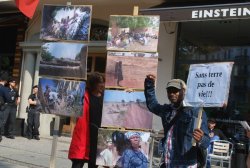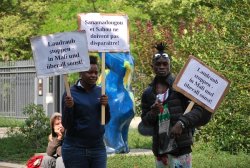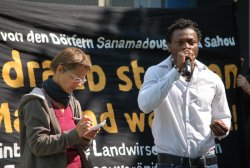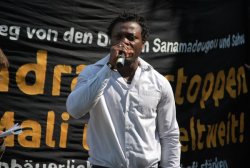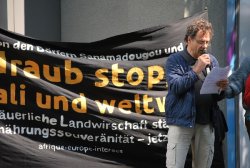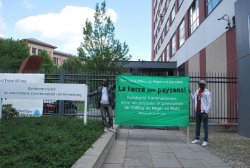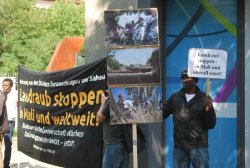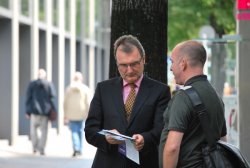August 2014 | Manifestation in front of the malian embassy and a german ministry in Berlin (including photos)
More information concerning the action: see below. The international appeal of Afrique-Europe-Interact pour Sanamadougou and Sahou can be read here
Open letter to the malian embassy in Berlin
Berlin, 20th August 2014
On the occation of the action in Berlin – and as an addition to the appeal – Afrique-Europe-Interact has send the following open letter to the malian embassy in Berlin. Furthermore the letter will be sent not only to different authorities of the government and administration but to several embassys of european countries in Mali as well.
MS
Hawa Keita eps. Ba
Ambassadoress of the Republic of Mali
Kurfürstendamm 72
10709 Berlin
Regarding the situation of the two villages Sanamadougou and Sahou in Office du Niger
Your Honorable Excellency Ms Ambassador of the Republic of Mali,
today we would like to turn to you regarding a matter of upmost urgency and ask you to forward our grievous concerns about the situation in Sanamadougou and Sahou to the government institutions and administrations in Bamako respectively Segou.
During the last few years Sanamadougou and Sahou in Office du Niger have lost most of their agricultural crop land and pastures. As a result the inhabitants are increasingly affected by hunger and more and more of them are forced to migrate. Alone in Sanamadougou 23 households have left in a period of only four months. Background to this is a lease agreement between the Mali government and the Société Moulins Modernes du Mali run by the large-scale investor Modibo Keita (Contrat de Bail Ordinaire N°001/PDG-ON) signed on 31st May 2010. Contrary to the contract which actually solely covers waste land, farmland actively used by both villages since before colonialisation is also affected.
For the past five years the villagers have pointed to the imminent problems with numerous letters, petitions and public campaigns without success. Additionally, with the support of CMAT („Convergence Malienne contre les Accaparements de Terres“) they have made the effort to bring the issue before the court in Markala. The case was finally opened on 22nd February 2012 but remains unresolved until today. Not even the written summons by the Minister for Land Use Planning and Decentralisation to the governor of Segou to put an end to Modibo Keita's ongoing human rights violations on 22nd March 2013 has lead to an alleviation of the problem.
On the other hand violent actions by state security forces have taken place – at first instance on 18th June 2010 when Modibo Keita without preannouncement had had numerous trees essential for agroforestry cut down. More than 40 farmers were arrested, others suffered in part serious injuries. In the aftermath brutal attacks – including rape of women – particularly by members of the gendarmerie kept taking place.
In April 2014 when the office of the Prime Minister set up a Government Commission of Inquiry (N° 0011/PM-CAB, 4. April 2014). It finally seemed that the issue began to be tackled. It is all the more disappointing that its as yet undisclosed final report largely follows the views of Modibo Keita respectively the official bodies („Rapport de mission relative a la Saisine de la Primature“). Indeed it is stated that the administration of the Office du Niger has failed to pay attention that the inhabitants of both villages are sufficiently informed. Its conclusion also demands that so far outstanding compensation money is paid out.
Yet, at the same time it states that the distribution of land was carried out in strict accordance to the lease agreement, that extensive indemnities had already taken place and that numerous village inhabitants were in support of the project. In a letter from 21st July 2014 the village chiefs have vehemently objected to this: They point to the fact that so far no indemnities whatsoever have taken place and that above all they could not agree to the seizure of their land. Moreover, 90% of the village inhabitants were in opposition of the project. Instead, the investor would mobilise inhabitants of the neighbouring village Diado to join official appointments who then claimed to be inhabitants of Sanamagoudou and Sahou and praised the project.
The events in Sanamadougou and Sahou have claimed prominence far across the borders of Mali: Concretely the case is investigated in a report of the internationally acclaimed Oakland-Institute based in the US (1); additionally, FIAN International – a Human Rights organisation with branches in over 50 countries – has approached President Ibrahim Boubacar Keïta in an open letter on 19th December 2013 (2). Finally, numerous journalists and delegations have visited both villages including activists of our network who have visited Sanamadougou and Sahou in February, May and August 2014.
On the whole not only the assaults by security forces are thoroughly documented. It is also quite obvious that the project does not fulfil its aims and expectations and in so far is breaching Article 43 of the Mali land laws as countless farmers have lost their livelihood. The latter is by no means outweighed by the job opportunities created by the project. Above all villages which have not known hunger so far are now affected by it.
Your honorable Ambassadress, with upmost respect we would like to ask you to do everything in your power to help that the land is returned to the affected farmers and that they receive compensation for entailed losses. To underline our concern we have drafted an European Appeal for the conservation of Sanamadougou and Sahou and registered for next Thursday rallies in front of the Embassy of the Republic of Mali in Berlin as well as the branch office of the German Federal Ministry for Economic Cooperation and Development. Because the conflict in Sanamadougou is not unique. Especially since the European Union with its policy regarding agriculture and biodiesel specifically fosters large-scale investment schemes on agricultural crop land, forest areas and pastures. We hence demand from the German government and governments of other European states to campaign for a peaceful settlement of the conflicts in Office du Niger.
Principally it is of importance for us to stress that we not only feel connected in friendship with the farmers in Sanamadougou and Sahou but also with the society of Mali as a whole. Our concern is based on solidarity, why we want to explicitly point out that we have donated 10 tons of millet to Sanamadougou and Sahou at the beginning of August. Generally we aim for an agricultural policy which puts small farmers at its centre. Because it is them who globally provide the bulk of food security.
Yours sincerely
Franzis Binder
(1) Comprendre les Investissements Fonciers en Afrique: Rapport Mali (2011): http://www.oaklandinstitute.org/comprendre-les-investissements-fonciers-en-afrique-rapport-mali
(2) http://www.fian.org/fileadmin/media/publications/OpenLetter_Mali_Dec2013.pdf

